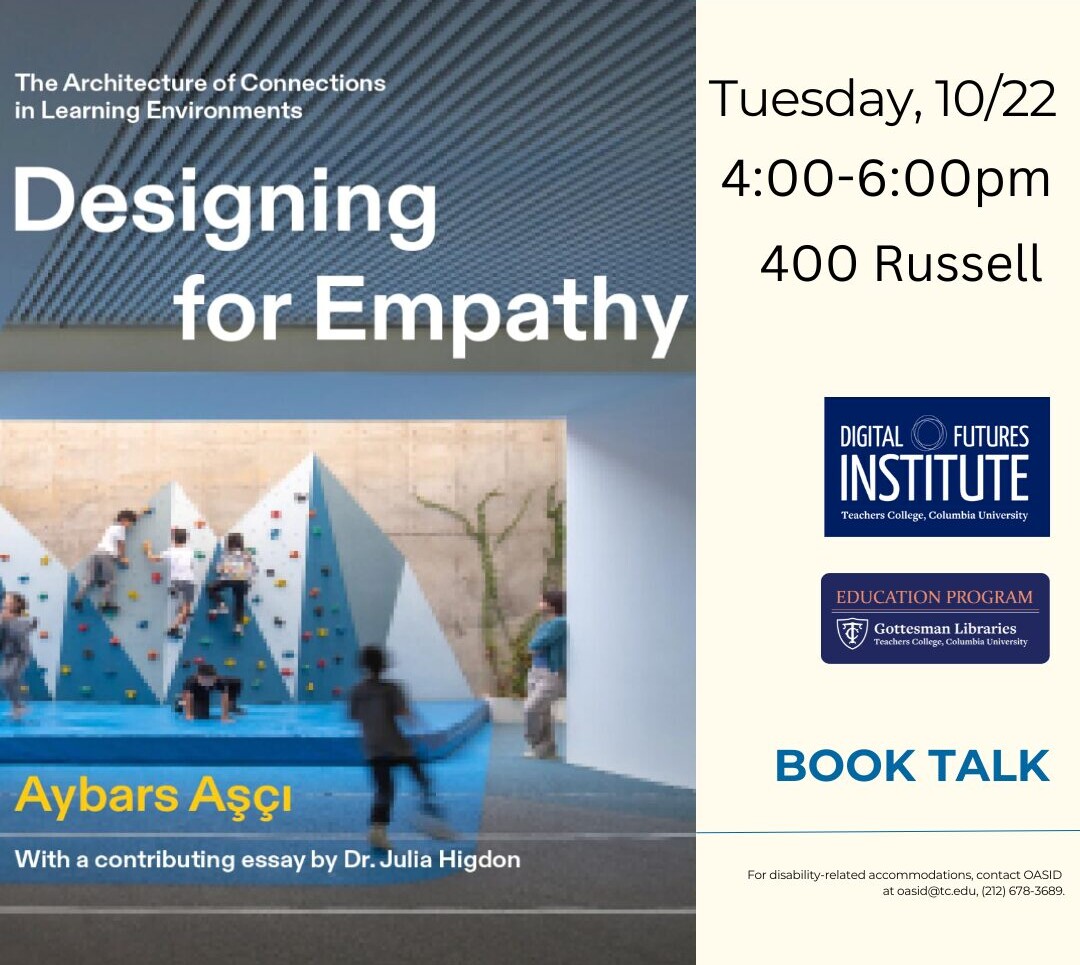
Book Talk: Designing for Empathy, with Aybars Aşçı & Julia Higdon
Join Aybars Aşçı and Julia Higdon, authors of Designing for Empathy: The Architecture of Connections in Learning Environments (ORO Editions, 2024) to discuss the inextricable relationship between developmental psychology and our physical environment.
‘The critical question guiding the book is: how can architecture influence human development, and by extension, how can concepts of empathy in development be influenced and catalyzed by architecture? Planners, architects, and designers are responsible for shaping our physical environment—from our homes, schools, and cultural and religious centers to the wider neighborhoods and cities within which human development takes place. However, architecture is conspicuously absent in most development theories, even though the environment is omnipresent.
Through research and design, architect Aybars Aşçı explores spatial constructs across a range of scales that situate learning environments through interpenetrations with their context, while also catalyzing narratives that are generated through translations between different people, forms of life, ideas, emotions, images, languages, and cultures. The premise of this approach is the collective rethinking of the learning environments, one that will inherently be more empathic as its spatial narratives are constructed through the interactions of its learners.’
– Book description
Aybars Aşçı, president and founder of Efficiency Lab for Architecture, is an advocate of research driven design that combines conceptual clarity with analytical processes such as the use of algorithmic tools and building performance modeling. As a practicing architect he has close to 20 years of experience, working in New York, London and Ankara, on projects located in North America, Central America, Middle East and Asia. As a former design director of Skidmore, Owings & Merrill LLP, he led multi-disciplinary teams on complex large scale projects for over 14 years, served in the leadership group of the firm with financial, legal and operational responsibilities, including the design leadership of London office. He has taught seminars and studios on efficiency, high rise design and environmental systems at The City College of New York, Cornell University, Pratt Institute and Northeastern University. Aybars also advocated environmental consciousness at design and policy making platforms. He is a board member of Center for Urban Disaster Risk Reduction & Resilience and holds a Master of Science in Advanced Architectural Design from Columbia University.
Julia Higdon is the Global Director for Research Analytics and Measurement at Tiger Works, R+D. at Avenues: The World School. Julia began her career as a teacher and holds a doctorate in education research from the Harvard Graduate School of Education. Julia contributed a seminal essay to Designing for Empathy.
The conversation will be moderated by Dr. Nancy Lesko, Executive Director for Teachers College Record. The panel of experts comprises Michelle Samura, Dean of Arts, Humanities and Social Science at Santiago Canyon College; Lindy Roy, Adjunct Professor at Columbia Graduate School of Architecture, Planning and Preservation (GSAPP) and founder and principal of Roy Studio; and Mary Elizabeth de Freitas, Professor at the School of Education, Ruth S. Ammon College of Education and Health Sciences, Adelphi University.
Coordinated by the Digital Futures Institute of Teachers College, Columbia University, this thought-provoking discussion will explore how architectural design influences human behavior, emotions, and learning processes. The distinguished panel will delve into Asci’s groundbreaking research on creating spaces that foster empathy, particularly in educational settings.
Interested persons may contact Shaneille Battle, Project Coordinator, DFI, for more information.
Register HERE.
Where: 400 Russell / Smith Learning Theater



